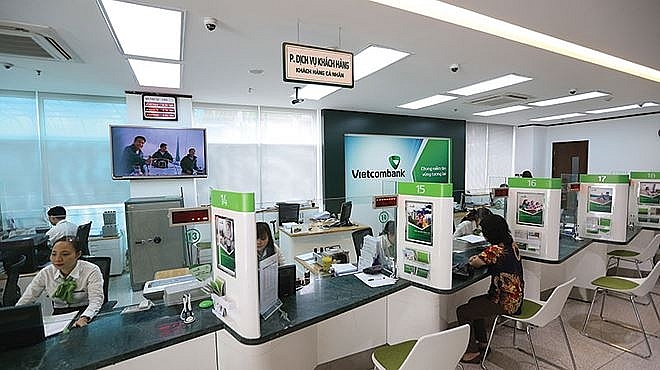Strong lenders continue to flourish
 |
| Vietcombank - illustration photo |
During the latest quarterly report, a number of Vietnamese lenders have posted rosy results. Vietcombank revealed that it earned VND11 trillion ($472.5 million) of pre-tax profits in the first nine months of 2018, doubling the year-on-year figure. The bank’s target for the entire year is VND13 trillion ($558.5 million) of pre-tax earnings, meaning that the state-owned lender is edging very close to its goal.
The nine-month result for TPBank came out at VND1.61 trillion ($69.1 million), also doubling last year’s figure and achieving 75 per cent of its 2018 target. A representative noted: “TPBank is confident of meeting our goals this year, on the back of very strong business activities.”
Oriental Commercial Bank, although it has not yet disclosed its latest results, is also positive that 2018 income will exceed its original target.
Last month, the statistics office of the State Bank of Vietnam (SBV) reported that 72 per cent of commercial banks saw a rise in their third-quarter earnings, and among those almost 16 per cent saw “a significant improvement”. More than 80 per cent of the surveyed banks were also optimistic about their fourth-quarter business results, and 30 per cent even expected a “tremendous hike” in earnings. Most banks are expanding their business and looking to hire more employees.
The optimism shows that after the SBV reined in credit growth to prevent a market bubble, Vietnamese banks have found innovative methods of making money. Vietcombank, for example, has almost reached the credit limit this year so the bank is pushing non-interest income activities including foreign exchange and account and transaction fees. Various other banks are pushing bancassurance, a long-term partnership between a lender and an insurance company.
In August, 14 Vietnamese banks received credit rating upgrades by international rating agency Moody’s, underpinned by the country’s higher sovereign credit scores. The upgrades are important for Vietnamese banks in order to attract foreign investors, who often consult Moody’s ratings when making investment decisions.
Investors have already taken notice. Earlier this year, Techcombank carried out an historic $922-million initial public offering, attracting major buyers such as the government of Singapore. Prior to this public sale, American investment giant Warburg Pincus had already poured $370 million into a private transaction. In 2017, the public debuts of HDBank and VPBank were also highly popular with investors. Meanwhile, TPBank attracted $40 million from Finland’s PYN Elite Fund, which already had a presence in Vietnam but had never previously invested in a Vietnamese bank.
Analysts at market research firm Stoxplus noted that Vietnamese bank stocks have indeed regained their appeal in the eyes of investors. Stocks of financial institutions have gone up 22 per cent from earlier this year, and each share is expected to give investors 29.9 per cent more earnings by the end of 2018.
The analyst added that several banks have tried to diversify their income sources, from signing bancassurance deals to expanding consumer loans programmes.
“Thanks to improved financial efficiency, progress made in bad debt resolution, effective digitisation, and thriving bancassurance partnerships, bank stocks have become attractive again,” said Stoxplus.
Viet Dragon Securities went one step further and said that this year is an unhappy one for bank investors around the world, except for those who poured money into Vietnamese lenders. The research team pointed out low return-on-equity levels at US and European banks and highlighted strong growth rates at Vietnamese lenders.
However, it is not straightforward for Vietnamese banks to bring in big money from strategic investors overseas, especially state-owned lenders such as Vietcombank or VietinBank. For instance, the strategic deal between the government of Singapore and Vietcombank has been on hold since 2016 despite an agreement having been signed. Pricing disagreements, corporate governance issues, and the existing foreign ownership cap are some of the biggest roadblocks for banks.
Experts such as Eric Sidgwick, Vietnam’s country director at Asia Development Bank, believe that it is urgent for Vietnamese banks to raise capital because the deadline for application for Basel II regulation accords is drawing near, and many banks are still struggling with the capital adequacy ratio.
What the stars mean:
★ Poor ★ ★ Promising ★★★ Good ★★★★ Very good ★★★★★ Exceptional
Related Contents
Latest News
More News
- Private capital funds as cornerstone of IFC plans (February 20, 2026 | 14:38)
- Priorities for building credibility and momentum within Vietnamese IFCs (February 20, 2026 | 14:29)
- How Hong Kong can bridge critical financial centre gaps (February 20, 2026 | 14:22)
- All global experiences useful for Vietnam’s international financial hub (February 20, 2026 | 14:16)
- Raised ties reaffirm strategic trust (February 20, 2026 | 14:06)
- Sustained growth can translate into income gains (February 19, 2026 | 18:55)
- The vision to maintain a stable monetary policy (February 19, 2026 | 08:50)
- Banking sector faces data governance hurdles in AI transition (February 19, 2026 | 08:00)
- AI leading to shift in banking roles (February 18, 2026 | 19:54)
- Digital banking enters season of transformation (February 16, 2026 | 09:00)

 Tag:
Tag:




















 Mobile Version
Mobile Version